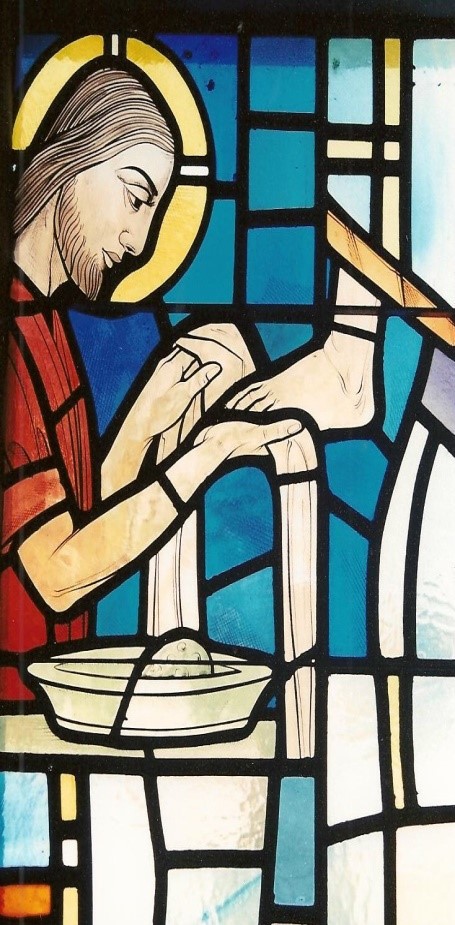 Maundy Thursday
Maundy Thursday
I was at theological college with a fellow who had worked as a nurse or orderly (I can’t remember which now), and he related a story of working in a hospital with a patient who had had a terrible accident with a bedpan, and basically there was mess everywhere. He and another nurse were helping to clean up, each were on either side of the bed and they got down on their hands and knees to clean the floor which was messy too, and they sort of came face to face under the bed. In this moment the other nurse said to Peter, “makes all the difference knowing you’re doing it for Christ, doesn’t it?”
At the time I don’t think I appreciated the anecdote, my colleague was a bit pious and I thought that you could undertake such an act of kindness for another without theologizing it. But interestingly that comment has stayed with me all these years. And I think there was more wisdom in it than I initially accepted. After all, Jesus himself, in the parable of the sheep and the goats, says as much you have done it to one of these least among my brothers and sisters you have done it for me.
Ubi Caritas, et armor, Ubi Caritas, Deus ibi est
Where there is charity and love, there is God.
The story reminds me of something I read once that suggested that Christians should wear little silver and gold bedpans around their necks rather than crosses, because that would symbolize more effectively the kind of service that we are called to, rather than a cross which may have lost its impact on us. I’m wracking my brains to remember who it was that said it, but I haven’t been able to locate it, but nevertheless it has stuck with me and ties in well with the other bedpan story.
Of course, in comparison to cleaning out bed pans, washing another’s feet is a piece of cake. Or is it? In Jesus’ day the streets were possibly the sewers too. One’s feet would probably not be in the greatest of states after a day of tramping the streets covered in various forms of animal and household waste. Thus the washing of one’s feet upon entering a house was an important sanitary act and an important show of hospitality. Providing this service would be the job of the lowliest of servants and certainly not something that a respectable rabbi would do.
I love the lines from the hymn an upper room in the third verse:
And after supper
he washed their feet
For service, too is sacrament.
In him our joy
shall be made complete –
sent out to serve, as he was sent
For service too is sacrament, and completes our joy to boot. Perhaps that is what my theological colleague was reminding me about.
Thank goodness for John’s gospel who makes this act of service the focus of the last supper. In fact there is no other reference to bread and wine in John’s last supper account, that has all taken place in earlier chapters in speaking of Jesus as the bread of life. Rather, here the point is made that if we want to follow Christ we have to be prepared to be servants – to take up our cross or bedpan or soap and towel and follow.
Now perhaps that is not the grandest selling point for the success of the Christian Gospel. But we should be reminded that there is mutuality in service. Like the wonderful Servant Song says–
Brother, Sister let me serve you,
let me be as Christ to you.
Pray that I may have the grace to
let you be my servant too.
There are times when we are called to serve and there are also times when we are called to receive the service of others. And sometimes that can be even harder for us to accept. Just like Peter really struggled with his lord and teacher washing his feet. “you will never wash my feet” he says to Jesus, and Jesus, quite harshly it seems, says : “unless I wash you, you have no share with me.” This is something that is totally non-negotiable. He goes on to say “If I your Lord and Teacher have washed your feet, you also ought to wash one another’s feet.” In that line is a whole philosophy of Christian equality and mutuality of service.
Tonight, we join with Christians around the world in including a footwashing liturgy in our service, not because there is anything dramatically important about the act of cleaning a foot, other than that we resist doing it. Rather we perpetuate this symbol because it encapsulates a whole theology of servant ministry that we as Christians have to embrace if we want to follow Christ.
In Matthew’s Gospel when James and John want the places of honour next to Jesus he replies: “You know that the rulers of the Gentiles lord it over them, and their high officials exercise authority over them. Not so with you. Instead, whoever wants to become great among you must be your servant, and whoever wants to be first must be your slave— just as the Son of Man did not come to be served, but to serve, and to give his life as a ransom for many.” (Matthew 20:25-28)
And Christ exemplifies this servanthood for us: “He loves beyond the uttermost” as the hymn says. Like Peter, even Jesus has moments of resistance, “Let this cup pass from me”, but he also shows acceptance and extreme servanthood. Jesus shows on the cross the extent to which servanthood will go, but that is for tomorrow’s sermon.
Tonight we stay with commemorating the last supper and the sacrament of service we are shown, and the sacrament of bread and wine which draw us into Christ’s fullness of life.
A lasting gift
Jesus gave his own:
to share his bread, his loving cup.
Whatever burdens
may bow us down.
He by his cross shall lift us up.
Ven Andrew Mintern 13th April 2017
Continue viewing more sermons in the 2017 Series of Easter Sermons by Ven Andrew Mintern
